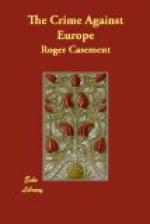Did we judge of Ireland only by many of the public utterances made in her name, then, indeed might we despair of a people who having suffered so much and so valiantly resisted for so many centuries were now to be won to their oppressor’s side, by, perhaps, the most barefaced act of bribery ever attempted by a Government against a people.
“Injured nations cannot so entirely forgive their enemies without losing something of their virility, and it grates upon me to hear leader after leader of the Parliamentary Party declaring without shame that Home Rule when it is won for Ireland is to be used for a new weapon of offence in England’s hands against the freedom of the world elsewhere.”
Did the Irish Parliamentary Party indeed represent Ireland in this, Mr. Wilfred Blunt’s noble protest in his recent work, The Land War in Ireland, would stand for the contemptuous impeachment, not of a political party but of a nation.
Mr. Redmond in his latest speech shows how truly Mr. Blunt has depicted his party’s aim; but to the credit of Ireland it is to be recorded that Mr. Redmond had to choose not Ireland, but England for its delivery. Speaking at St. Patrick’s Day dinner in London on March 17th, 1913, Mr. Redmond, to a non-Irish audience, thus hailed the future part his country is to play under the restoration of what he describes as a “National Parliament.”
“We will, under Home Rule, devote our attention to education, reform of the Poor Law, and questions of that kind which are purely domestic, which are, if you like, hum-drum Irish questions, and the only way in which we will attempt to interfere in any Imperial question will be by our representatives on the floor of the Imperial Parliament in Westminster doing everything in our power to increase the strength and the glory of what will then be our empire at long last; and by sending in support of the empire the strong arms and brave hearts of Irish soldiers and Irish sailors, to maintain the traditions of Irish valour in every part of the world. That is our ambition.”
Were this indeed the ambition of Ireland, did this represent the true feeling of Irishmen towards England, and the Empire of England, then Home Rule, on such terms, would be a curse and a crime. Thierry, the French historian, is a truer exponent of the passionate aspirations of the Irish heart than anyone who to-day would seek to represent Ireland as willing to sell her soul no less than the strong arms and brave hearts of her sons in an unholy cause.
“... For notwithstanding the mixture of races, the intercommunion of every kind brought about by the course of centuries, hatred of the English Government still subsists as a native passion in the mass of the Irish nation. Ever since the hour of invasion this race of men has invariably desired that which their conquerors did not desire, detested that which they liked, and liked that which they detested ... This indomitable persistency, this faculty of preserving through centuries of misery the remembrance of lost liberty, and of never despairing of a cause always defeated, always fatal to those who dared to defend it, is perhaps the strangest and noblest example ever given by any nation.” (Histoire De La Conquete De L’Angleterre Par Les Normands, Paris edition, 1846. London, 1891.)




